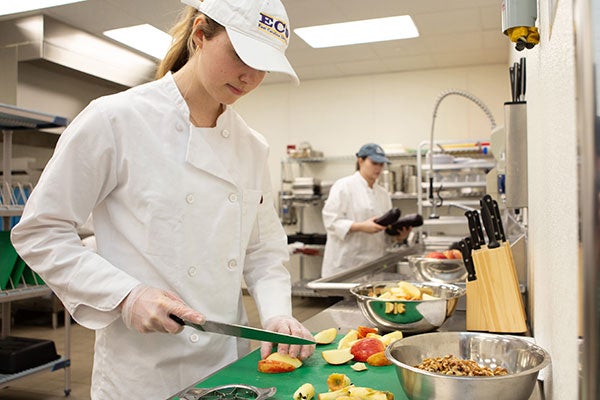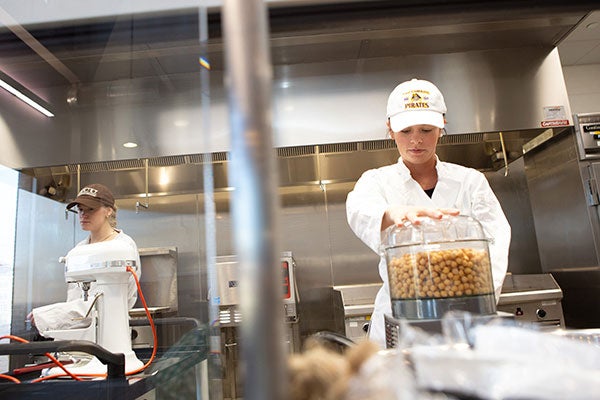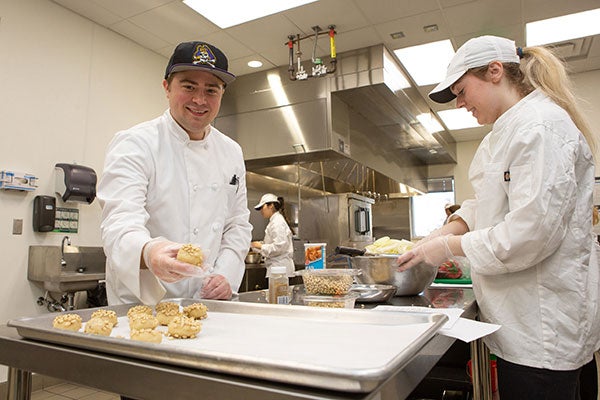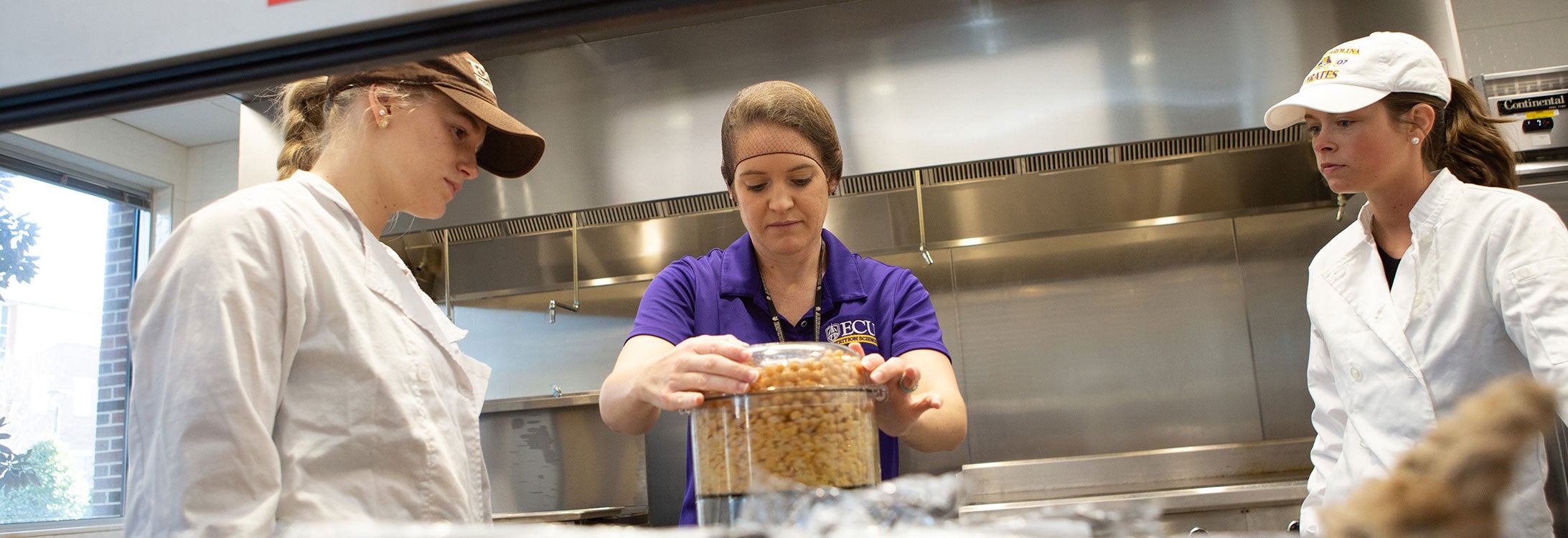Students lead café kitchen at ECU, learning nutrition and food service skills
In early February, students in chef’s coats and a motley array of East Carolina University baseball hats fired up the grills, sharpened the knives and turned on the cash registers in a restaurant kitchen that had sat vacant for years.

ECU nutrition sciences student Julia Maple prepares a salad in the kitchen in the No Quarter Café at the Health Sciences Students Center.
Crashing pans, vegetables dancing across a griddle and a dose of quiet determination transformed the silent space into the No Quarter Café, an opportunity for students to learn the ins and outs of large-scale food production while also filling a nagging need for healthful food options on the Health Sciences Campus.
Roxanne Wilder, a clinical assistant professor with the College of Allied Heath’s nutrition science department, said the No Quarter Café is a win-win for both her students and the learning community they are a part of.
Wilder’s students are aspiring to be dietitians, to put their education to use in hospitals, long-term care facilities and other food service operations. In recent years, her students have prepared meals in a way-too-small commercial kitchen in the Rivers Building. In 2023 students pre-packaged meals that were sent to the Health Sciences Campus; more recently main campus customers were served in person.
This spring, Wilder and her students moved to the commercial space in the Health Sciences Student Center — with its spacious kitchen that better resembled facilities they may work in after graduation.
But most importantly, the new accommodations allowed students to interact directly with diners.
“Our students like interacting with the customers, seeing them enjoy the food, seeing them be excited about the menu and come back week after week,” Wilder said. “Also, a lot of our students are not from eastern North Carolina. If they plan to stay and work here, they can learn what types of food people in the region prefer, which gives them an idea of things that, as dietitians, they can include on a patient menu.”
One challenge for Wilder is teaching students how to prepare and feed their future patients through realistic in-kitchen experiences, where they can plan nutritious and inviting menus at the scale of a restaurant or hospital and keep the food warm, or cold, but most importantly safe.
ECU’s Health Sciences Campus has battled to offer food options for students, faculty and staff, but the dip in the population during the summer months made keeping restaurants open year-round challenging. Food trucks were an intermittent stopgap, but the need for high-quality food options remains.
Wilder and her students recognize that their once-a-week offerings won’t completely fill the need, but it’s a start and a learning opportunity that will translate to patient care.
Serving customers
Wilder said giving each of her students an opportunity to select the day’s menu and oversee the work being done in the kitchen gives them an opportunity to practice the managerial roles they will assume in the future.

Two ECU nutrition sciences students prepare food in the kitchen at the No Quarter Café.
“They’re not going to be the ones preparing the meals day in and day out; they’re going to be the ones planning the menus. They’re going to be the ones making sure that food safety guidelines are followed day in and day out to ensure patients are getting the nutritional value that they need in their meals,” Wilder said.
In addition to high-level managerial skills, students are also practicing hands-on kitchen skills — like knowing when to start cooking specific items to be ready for the lunch meal — so directions to kitchen staff are realistic and manageable.
Cost is also a consideration that Wilder requires her students to consider. In a restaurant setting customers demand value for the food they buy. In a clinical kitchen, cost savings are no less important.
“In a hospital or long-term care facility, they may have a $2 budget for a lunch meal. It’s probably going to be unrealistic to include a turkey burger or prime rib on that menu because they’re not going to meet their budget, so they need to know how to work within those constraints,” Wilder said.
In the fall semester the nutrition students were tasked with preparing meal plans for clinical and long-term care facilities during natural, or even man-made, disasters — a very real possibility in light of the impact of Hurricane Helene in the mountains and the yearly threat of hurricanes on the coast.
“They have to come up with a four-day menu that would work during a disaster, so limited refrigeration, limited freezer space. You’ve lost water, you’ve lost freezer space, you’ve lost the ability to receive supply trucks,” Wilder said.
If you compound these challenges with patients who are diabetic or suffer from celiac disease, and the training and experience Wilder’s students receive in the No Quarter Café translate to life saving skills for future patients.
Meeting a Need
Julia Maple, a native of Pittsburg, transferred into ECU’s nutrition program as a sophomore from a school in Ohio. She was in charge of the Mediterranean menu and kitchen Feb. 5 — lots of olives, lemon, cucumbers, tomatoes. She was personally responsible for an arugula salad with apples and chicken.
“It’s one of my favorite types of cuisines, so I thought why not? It’s healthy and kind of trendy right now. I thought it would be a good fit and luckily, it’s 70 degrees outside, so I think that this will go well with the current weather,” Maple said.
She has applied to the department’s graduate program to continue her education and eventually work in clinical outpatient settings. Being in charge for the day gave her a sense of the hectic nature of food work.
“It’s a lot of pressure, to have your menus ready and we worked really hard last semester. It’s been really rewarding,” Maple said.
During the Mediterranean day, Morgan Wynn, a senior from the town of Bear Grass, northeast of Greenville, was responsible for No Quarter Café’s front end — preparing the service line, cleaning and handwriting the day’s menus on a white board. She was the student manager the second week the café was open and valued being able to watch their customers place orders at the register.
“Going into my future career as a dietitian, you’re with people constantly and it’s great practice, even if I don’t end up in food service,” Wynn said.
Learning how to care for patients with diabetes is critical for Wynn. Her father and fiancée both manage the disease.
“I love my major. It’s really personal, but I know I’m going to help tons of people in the future,” Wynn said. “Food is a huge part of life, every part of your life, so being able to learn about it and the science has been really cool.”
Weazy King, from Carolina Beach, was tasked with preparing a leek and cannellini bean soup. She hopes to use her education to supplement her job as a personal trainer, knowing firsthand about the importance of diet to health and wellness having recovered from several surgeries after a punishing high school soccer career.

ECU nutrition sciences students roll out cookies to bake for the noon meal at the No Quarter Café.
“Food can taste good and be good for your body. I was really big into sports and had a bad injury, so that’s why I wanted to go into nutrition. I love outpatient work because you get more time to connect with the patient versus see them for five minutes in a hospital setting,” King said.
Raleigh native Abigail Terrill was raised in a family that grew vegetables and flowers and ran an animal sanctuary. She is currently the program’s lone vegan, having fully given up animal products seven years ago, and is using her diet to direct the menu she will offer later in the semester.
“I’m hoping with my menu the other students will learn to like things and learn how to actually cook vegan products like tofu because you can make it amazing as long as you have the right sauces and marinades,” Terrill said.
Terrill’s menu will focus on Asian dishes — tempura vegetables, a cucumber salad and a vegan pad thai — that she is admittedly nervous about customers liking. But she has faith that the flavors will transcend any cultural hesitancy.
She hopes to take her ECU education to the Triangle after graduation and work in a clinical setting, where she has spent time in job shadowing opportunities.
Terrill hopes her meat-free menu is a hit for eastern North Carolina eaters, but either way she and her peers are learning the importance of meeting the health and wellness needs of a community, one plate at a time.
Weekly menus are available on the Nutrition Sciences’ No Quarter Cafe Facebook and Instagram feeds.
